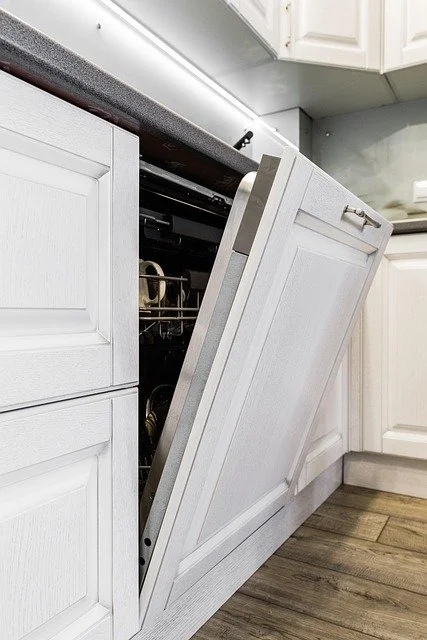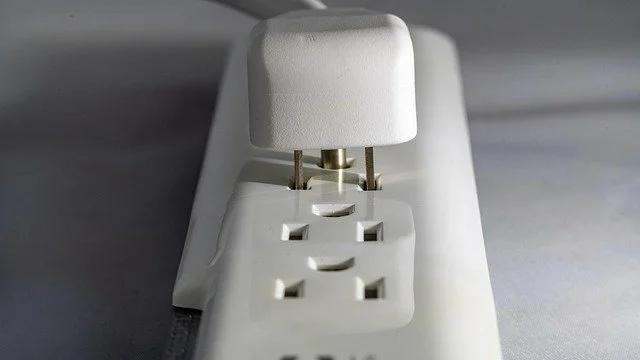Keep your home, family, and investment safe with this expert-backed appliance safety guide.
It’s that time of year again. The nights grow longer, pumpkins flicker on doorsteps, and every whisper in the dark sends a shiver down your spine. You half-expect the floorboards to creak with ghosts. But before you blame specters, consider this: some of the scariest things in your house are humming and clicking right now, hiding in plain sight. This isn’t about phantom footsteps or whispering shadows. It’s about wires, motors, lint-filled vents, and components pushed past their limits. And sometimes, yes — these haunted appliances can start real fires. Let’s stroll through your home… slowly. These are the everyday appliances most likely to misbehave. Watch for them. Then prepare. Because even in a modern house, the supernatural doesn’t need to exist to get flames.
The Oven That Smolders in Silence
Your oven is supposed to cook food — not cook your wiring. Over time, grease and food debris that build up across the inside surfaces can ignite when temperatures climb during normal usage. Even a heating element or internal wire that has become worn or brittle might short out under load, especially in older units. The self-cleaning function, though designed to burn off residue, sometimes overheats parts, accelerating internal damage instead of curing it. To reduce this danger, clean spills, charred residues, and built-up grease regularly (always after the unit cools), and never leave the oven running when no one is home. If, after using it, you detect a strange smell or flicker of light behind the door glass, stop using the unit immediately and call a technician to inspect it.
The Stove That Becomes a Cauldron
Simmering sauce is one thing — but your stovetop can turn into a fire risk if you're not careful. Many home fires begin right at the stove, often from unattended cooking, oil splatters, or pans left too close to open flames. A stray drop of hot oil can leap off a pan, or a rag or piece of cookery paper too close to a burner can catch fire in seconds. The danger grows when you step away, distracted by guests, texts, or just thinking ahead. The rule is simple: stay in the kitchen while cooking. Keep everything flammable — towels, curtains, ingredient bottles — well away from the stovetop. Have a fire extinguisher in reach and know how to use it, and if grease does ignite, never toss water at it; smother it with a lid or baking soda.
The Dryer That Smells Like Smoke
Your laundry room may feel cozy, but if your dryer begins to stink of burning lint, alarm bells should ring. Dryer fires are among the most common types of appliance fires. That’s because the lint trap, internal vents, and area around the heating element are prime spots for lint to accumulate. When vents are clogged, heat has no escape, and components begin to overheat. The result can be ignition in a narrow crevice you never see. To guard against this, clean the lint trap each time you run the dryer. Vacuum lint from around the dryer and behind it often. Schedule a professional vent cleaning annually. And never try drying anything saturated with oily substances or chemical residues — that one load can be the one that sparks a disaster.
The Fridge That Overheats Behind Closed Doors
Refrigerators and freezers feel safe — quiet, cold, dependable. But lurking inside that comfort can be silent dangers. Electrical wiring can fray, insulation may degrade, or component failures might cause overheating near compressors or motors. A light bulb left active when the door sticks or fails to close fully can also generate unexpected heat inside an otherwise cold cavity. Blocked airflow or dirty condenser coils force the compressor to work harder, producing more heat than it should. To avoid disaster, make sure condenser coils are dust-free, inspect cords for wear or cracks, and listen for buzzing or hums that seem out of place. At the first sign of burning plastic or anomalous heat, unplug the unit and call for a technician.
The Dishwasher That Conceals a Threat
Running your dishwasher while you sleep or run errands seems convenient — except that a hidden fault can turn it into a fire hazard. When a heating element shorts, when wiring gets brittle, or when a small leak allows water to reach electrical parts, sparks can develop in the dark, unnoticed. Even residual grease and stuck food bit inside filters and plumbing channels can heat up under a failing thermostat. The remedy is to operate your dishwasher while someone is home. Clean out filters and spray arms periodically to prevent buildup. During service calls, have hose connections and internal wiring inspected. That way, you won’t gamble your home’s safety on the quiet hum of a nightly cycle.
The Microwave That Turns Mischievous
Microwaves are ubiquitous — safe when used correctly, dangerous when pushed to the edge. A slip-up with metal foil or a stray spoon can cause internal sparks. Old wiring or worn components may arc under stress. And when food is overheated in non-microwave-safe containers, the internal circuits strain. That little pop or flash can quickly escalate. Use only microwave-safe dishes (no metal, no foil). At the first sign of a spark or crackle, unplug the unit immediately and discontinue use. If the problem recurs, bring in a technician to examine internal wiring and components.
The Space Heater That Creeps Too Close
A space heater gives warmth and comfort — until it’s too close to flammable material. Draped sheets, furniture edges, curtains, or rug fibers all pose ignition risks when placed too near. A heater plugged into an extension cord or overloaded outlet compounds danger. Running a heater while you sleep or leave the house is just asking for trouble. Always maintain a buffer zone of at least three feet around space heaters. Plug them only into dedicated wall outlets (never into power strips or extension cords). And for safety, turn them off whenever you wake up or step out.
The Hidden Peril of Power Strips & Cords
You might start by plugging in one device, then another, then another — until an overloaded power strip becomes a ticking time bomb. Strips burdened with high-wattage appliances can overheat internally and spark. Running cords under rugs or behind heavy furniture wears insulation and traps heat. Frayed or damaged cords arc internally, igniting nearby material. Use surge protectors only for low-power electronics, never for major appliances. Keep cords visible, never pin them under rugs or furniture, and immediately replace any wire that shows wear, cracking, or exposed conductors.
When the Haunting Turns Real
A flicker in a hallway, a whiff of burning plastic, a breaker that trips again — those are not supernatural signs, they’re alarms your house is sounding. If you detect smoke or odd electrical hums, unplug the appliance (if it’s safe to do so) and shut the circuit off at the breaker. Don’t ever re-energize it, even just to “test.” Call a qualified electrician or appliance technician to assess the damage. Sometimes the fix is simple: cleaning vents, replacing wiring, or tightening connections. Other times, a full repair or replacement is necessary. The point is this: minor flaws can escalate fast. Don’t wait.
Don’t Let Your Home Become a Horror Show
You decorate your yard for jolts and thrills. You carve pumpkins and hand out candy. But inside — deep in your walls and behind your appliances — you want stability, safety, and silence. By staying vigilant, cleaning regularly, and calling professionals at the first hint of trouble, you right the balance. You transform your home from a potential haunted maze into a secure sanctuary.
This Halloween, don’t blame ghosts if your home begins to hiss, spark, or groan. Most of what seems haunted is just an appliance — stressed, neglected, or failing. And those appliances are likely your refrigerator, oven, stove, freezer, washer, dryer, dishwasher, or ice maker. If any of these major units act up, give Appliance Rescue Service a call. Whether it's inspection, maintenance, or repairs, we specialize in taming those haunted machines. Let us quiet your home and restore peace — no exorcist needed.
Stay safe. Stay observant. And let your only chills this season come from ghosts in films — not your appliances.





